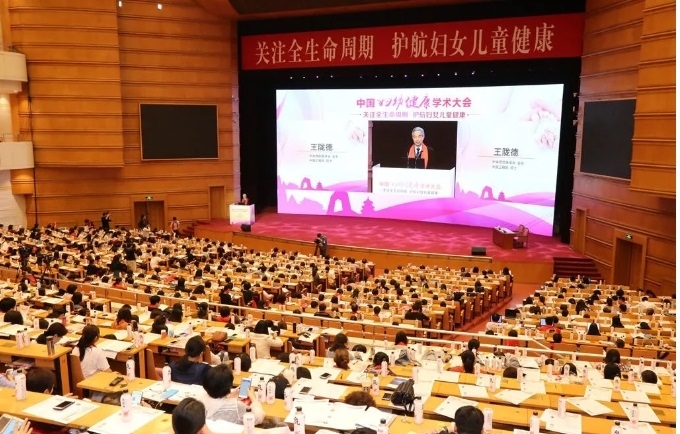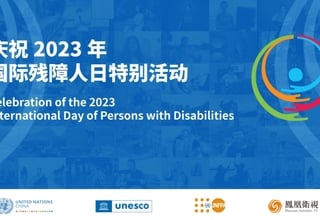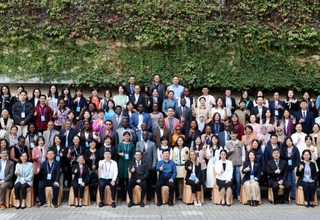The China Women’s and Children’s Health Conference co-hosted by China Preventive Medicine Association (CPMA), The George Institute for Global Health (TGI) and the United Nations Population Fund (UNFPA) China Office was held in Beijing from 19-20 May 2019. The conference offered an opportunity to share ideas and best practices, and to discuss emerging issues in women and children’s health.
The conference, as a forum for academic presentations and discussion under the Healthy China 2030 Strategy and the global 2030 Agenda for Sustainable Development, brought together over 1,700 participants. They come from national and local health and disease control institutes, medical schools and research institutes. Around 100 national and international experts shared their knowledge and experiences through thematic presentations or panel discussions.
The theme for the conference is “focus on the life-course to promote women’s and children’s health”.
The opening ceremony featured Wang Longde, President of CPMA and academician of Chinese Academy of Engineering, Zhang Li, Deputy Director of National Working Committee on Children and Women (NWCCW) under the State Council, Babatunde Ahonsi, UNFPA Representative in China, Amanda Henry, Senior Researcher of Global Women’s Health Programme of TGI, and Zhang Tuohong, Technical Officer of World Health Organization (WHO) in China. Zhang Lingli, Deputy Secretary General of CPMA moderated the opening ceremony.
Wang Longde said the Chinese government has always attached great importance to women’s and children’s health. CPMA has more than 10 branch institutes that focus on different areas of women’s and children’s health and has contributed to the national policy-making and knowledge sharing on women’s and children’s health, and transformation of scientific and technical payoffs.
Zhang Li said upholding women and children’s right to health is key for achieving the Chinese Dream of prosperity and national glory. The NWCCW has kicked off the technical consultation for the development of the new round China Women and Children’s Development Programme.
Babatunde Ahonsi highlighted the importance of ensuring rights and choice for all. Over the past 50 years, the global movement to empower women to make their own decisions about whether, when and how often to become pregnant gained momentum. The right to decide freely and responsibly on the timing and spacing of children was acknowledged in Cairo in 1994 International Conference on Population and Development, where 179 governments endorsed a global programme of action that linked women’s empowerment, rights and sexual and reproductive health to sustainable development. However, there is a long way to go before all women, everywhere have access to sexual and reproductive health and are able to realize their rights.
Amanda Henry addressed the burden of non-communicable diseases (NCDs) for women. She said in almost every country, including China, NCDs and injuries are now a leading cause of deaths for women. She called for women’s health policies to prioritize NCDs through a life course approach.
Zhang Tuohong said China has greatly reduced maternal and child mortality rate in the past four decades and made significant efforts in achieving the Millennium Development Goals.
Song Li, Deputy Director General of the Department of Women’s and children’s health of National Health Commission, which provided overall guidance and support to the conference, presented the progress and prospect of women’s and children’s health in China. She said China has made five major remarkable achievements on women’s and children’s health in recent years: improved women’s and children’s health conditions; improved accessibility of women’s and children’s health services; addressed major women’s and children’s health issues; strengthened women’s and children’s health system; and strengthened laws and regulations on women and children’s health. However, China still faces challenges in equal access in urban and rural areas; the cases of high-risk pregnancy is also increasing. She called for more innovative and community-based approaches to address the issues.
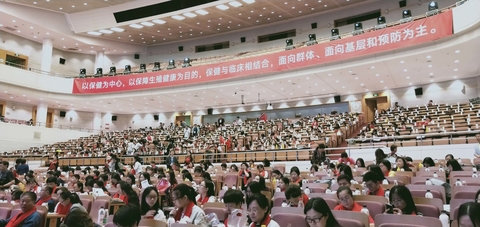
On the second day of the conference, the Women’s Health Branch of CPMA together with UNFPA China jointly organized the women’s health sub-forum. Navchaa Suren, Deputy Representative of UNFPA China highlighted the sexual and reproductive health needs for women and young people and addressed the importance of integration of rights based, gender sensitive maternal and child health and family planning services for women’s life course. After the two-child policy introduced in 2016, China is now facing critical challenges of increasing number of women in 40s opting for a second child, increasing prevalence of infertility, and gaps in access to family planning services.
She pointed out the onset of adolescence brings not only changes to young people’s bodies but also new vulnerabilities, putting them at risk of unwanted pregnancies, sexually transmitted infections (STIs) including HIV, and sexual violence. It is important to provide young people with age appropriate, culturally sensitive and scientifically accurate information, to enable them to make informed decisions about their sexual and reproductive health. Saramma Thomas Mathai, the UNFPA consultant on sexual and reproductive health gave a detailed presentation on the integration of maternal and child health and family planning services in China.
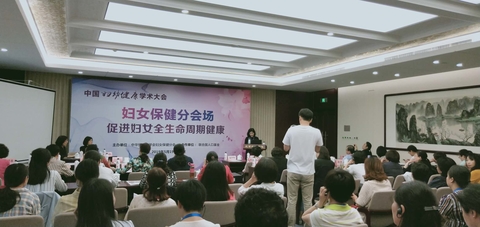
There were 12 parallel sub-forums covered various topics of women’s health, adolescent health, children’s health, birth defects prevention and control, reproductive health, vaccination and immunization, perinatal intervention and disease control, pelvic floor dysfunction prevention, obesity and malnutrition among children and adolescent, chronic diseases, female infertility and mental health care for working women and so on.
